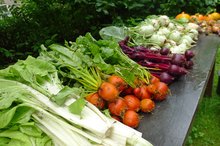Do Vegetables Cause Diarrhea?
In general, vegetables do not cause diarrhea, unless you have another medical condition that results in diarrhea. Diarrhea is a condition that most people experience at some point in their life, but if you develop diarrhea every time you eat certain vegetables, you should seek medical attention to determine the cause. The most common cause of diarrhea from eating certain vegetables is food intolerance or a food allergy. Both of these conditions cause irritation in the digestive system that can lead to loose, watery and frequent stools.
If you are experiencing serious medical symptoms, seek emergency treatment immediately.
Diarrhea
There is a difference between loose stools and diarrhea. Loose stools can occur from eating greasy foods or eating too much fiber. Diarrhea is a condition in which your digestive system attempts to empty itself by passing its content much faster than usual. Diarrhea typically lasts for one to two days and needs to be evaluated by a doctor if it lasts more than two days. Diarrhea that contains blood or mucus is an alarming symptom that needs further assessment.
- There is a difference between loose stools and diarrhea.
- Diarrhea is a condition in which your digestive system attempts to empty itself by passing its content much faster than usual.
Vegetable Intolerance
Why Does Juicing Vegetables Cause Indigestion?
Learn More
If you are intolerant to certain vegetables, you will develop diarrhea within 20 minutes or up to two hours after eating the food. Food intolerance is a defect of the digestive system 1. During digestion, the linings of your intestines produce essential enzymes that help break down the proteins and sugars in the vegetable. If you lack specific enzymes to digest specific vegetables, the food will sit in the gut until bacteria can break it down. The bacterium causes gas, bloating, nausea and diarrhea as a result.
- If you are intolerant to certain vegetables, you will develop diarrhea within 20 minutes or up to two hours after eating the food.
- During digestion, the linings of your intestines produce essential enzymes that help break down the proteins and sugars in the vegetable.
Vegetable Allergy
Although uncommon, you may have an allergy to certain vegetables. An allergy is different from intolerance primarily because it is an immune system reaction. If you’re allergic to certain vegetables, your immune system mistakes the proteins in certain vegetables as dangerous and fights against them. Antibodies and histamine are two primary chemicals that the body creates to fight off the vegetable proteins. This action leads to inflammation and swelling in the gut, causing diarrhea.
- Although uncommon, you may have an allergy to certain vegetables.
- If you’re allergic to certain vegetables, your immune system mistakes the proteins in certain vegetables as dangerous and fights against them.
Warning
Does Eating Only Vegetables Every Day Make You Lose Weight?
Learn More
The main concern associated with diarrhea is dehydration. During diarrhea your body is depleted of water and salts that keeps the body functioning. If you lose too much water and salt, you can become dehydrated. Dehydration is a medical condition that needs attention because it can lead to death if not treated.
- The main concern associated with diarrhea is dehydration.
- If you lose too much water and salt, you can become dehydrated.
Related Articles
References
- American College of Gastroenterology: Food Intolerance
- Barr W, Smith A. Acute diarrhea. Am Fam Physician. 2014;89(3):180-9.
- Schiller LR, Pardi DS, Sellin JH. Chronic Diarrhea: Diagnosis and Management. Clin Gastroenterol Hepatol. 2017;15(2):182-193.e3. doi:10.1016/j.cgh.2016.07.028
- National Institute of Diabetes and Digestive and Kidney Diseases. Eating, diet, and nutrition for diarrhea. Updated November, 2016.
- Diarrheal Diseases – Acute and Chronic. American College of Gastroenterology.
- Minocha A, Adamec C. The Encyclopedia of the Digestive System and Digestive Disorders (2nd Ed.) New York:Facts on File. 2011.
- National Institute of Diabetes & Digestive & Kidney Diseases. Diarrhea.
Writer Bio
Diane Marks started her writing career in 2010 and has been in health care administration for more than 30 years. She holds a registered nurse license from Citizens General Hospital School of Nursing, a Bachelor of Arts in health care education from California University of Pennsylvania and a Master of Science in health administration from the University of Pittsburgh.









